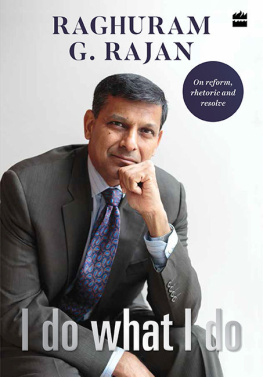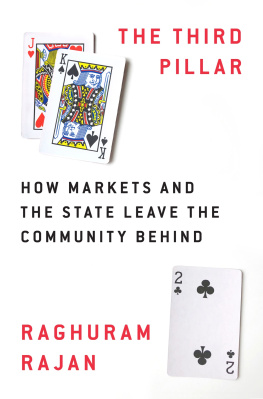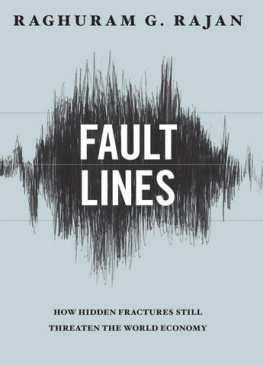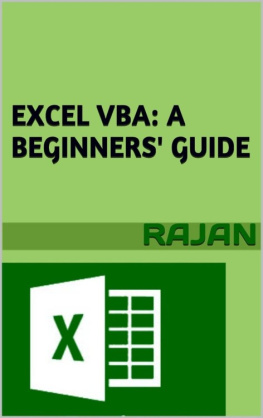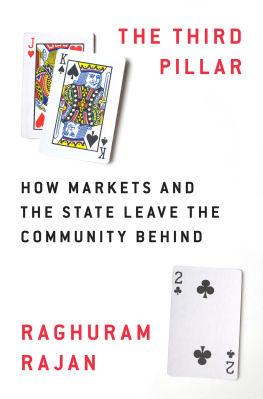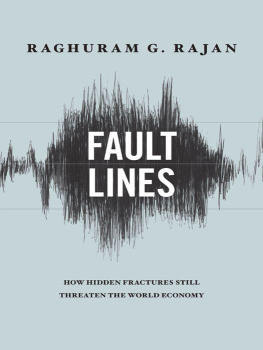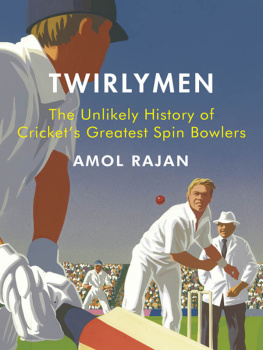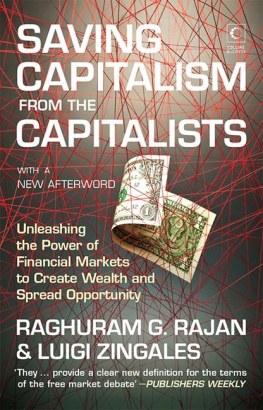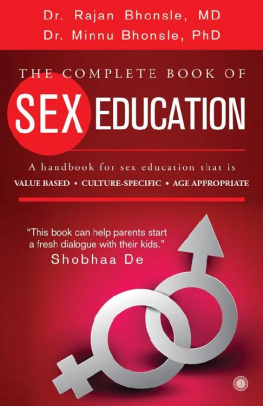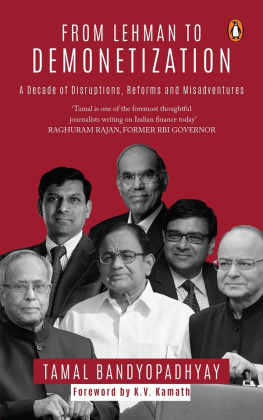Raghuram G. Rajan - I Do What I Do
Here you can read online Raghuram G. Rajan - I Do What I Do full text of the book (entire story) in english for free. Download pdf and epub, get meaning, cover and reviews about this ebook. year: 2017, publisher: HarperCollins India, genre: Science. Description of the work, (preface) as well as reviews are available. Best literature library LitArk.com created for fans of good reading and offers a wide selection of genres:
Romance novel
Science fiction
Adventure
Detective
Science
History
Home and family
Prose
Art
Politics
Computer
Non-fiction
Religion
Business
Children
Humor
Choose a favorite category and find really read worthwhile books. Enjoy immersion in the world of imagination, feel the emotions of the characters or learn something new for yourself, make an fascinating discovery.
- Book:I Do What I Do
- Author:
- Publisher:HarperCollins India
- Genre:
- Year:2017
- Rating:4 / 5
- Favourites:Add to favourites
- Your mark:
- 80
- 1
- 2
- 3
- 4
- 5
I Do What I Do: summary, description and annotation
We offer to read an annotation, description, summary or preface (depends on what the author of the book "I Do What I Do" wrote himself). If you haven't found the necessary information about the book — write in the comments, we will try to find it.
I Do What I Do — read online for free the complete book (whole text) full work
Below is the text of the book, divided by pages. System saving the place of the last page read, allows you to conveniently read the book "I Do What I Do" online for free, without having to search again every time where you left off. Put a bookmark, and you can go to the page where you finished reading at any time.
Font size:
Interval:
Bookmark:
I DO WHAT
I DO
RAGHURAM G. RAJAN

CONTENTS
E arly in my tenure as the Governor of the Reserve Bank of India (RBI), Krishan Chopra of HarperCollins asked me to write a book. He suggested putting together edited versions of my past articles and speeches under different themes. I pleaded that I was extremely busy, and simply did not have the time. As my term came to an end, however, I realized time would be less of a constraint. In the speeches I gave while at the RBI, I had been describing the reforms we were undertaking and the rationale behind them, both to build confidence amongst investors and to get support from the public. If I could link the speeches together in a book with commentary about what prompted each speech, I could give the youth of the country a feel for the excitement of working at the central bank. I hoped this would attract a few into the area of economics and finance, where India really needs more good people. Moreover, if I could describe the overall rationale for what had been done, completed reforms could stand a better chance of not being reversed, while incomplete reforms could be finished.
I did not want to intrude on my successors initial engagement with the public, so I determined to stay silent on India for a year. This book will be published after that year is over. Also, while I have tried to explain my rationale for various speeches and actions through linking commentary, I have respected the privacy of conversations I had with various public figures. I have also added a short selection of some speeches and articles that I wrote, primarily while I was the Chief Economist at the International Monetary Fund, but also while at Chicagos Booth School of Business before I joined the RBI.
The title of this book reflects the serendipitous nature of public life. I enjoyed the give-and-take of press conferences after monetary policy meetings, especially because I knew most of the reporters. As one press conference was ending, I was asked (yet again) by a familiar face whether I was dovish like Yellen or hawkish like Volcker. I understood what the reporter was asking, but I wanted to push back on the attempt to pigeonhole me into existing stereotypes. Somewhat jokingly, I started in a James Bond-ish vein, My name is Raghuram Rajan To my horror, mid-sentence I realized I did not know how to end in a way that did not reveal more on monetary policy than I intended. So with TV cameras trained on me, I ended lamely and I do what I do. For some reason, that sentence became the financial press headline the next day, with the details of our monetary policy relegated to the inside columns. The commentary on social media even reached my usually supportive daughter, who emphasized her negative reaction to my unwitting sentence with repeated thumbs-down emojis!
In a sense, though, the headline was apt. Two different governments had largely given me free rein at the Reserve Bank, reposing their trust in me. Knowing I had a three-year term, I could push hard for change. Eventually, the usual opposition from vested interests would build up, but I hoped the RBI would complete much of the needed reforms by then. And indeed it did.
I came into office during the currency crisis, when India was termed one of the Fragile Five. So my first task was stabilization. But right from the beginning, I realized that the prospect of financial sector reforms would be an aid to stabilization. With India making the transition from low-income to middle-income country, the need for these reforms was clear. Of course, reforms are an ongoing process, and they can be reversed. This was why it was important to embody the reforms in new institutional mechanisms, as well as build ownership of reforms within the RBI and amongst external stakeholders.
And that brings me to teamwork. This was not my first job in management. But I became head of an organization of 17,000 people, with assets of more than $400 billion. How does one manage such a large organization? Obviously with help. I have always found that the single most important task in management is to pick good deputies, and I managed to get very good ones. My role was to set the overall agenda (of course, in consultation with them), get the concurrence of the government, draw out the vast experience of my colleagues to fill out the details and rule out inadvisable steps, push and prod the organization where necessary so that we stuck to timelines, and then roll out the measures after engaging with stakeholders, including the public.
We did not undertake reforms by stealth. While the full import of some of the actions we took may not have been obvious early on, making it harder for opposition to crystallize, the roadmap for much of what we did was set by various RBI-appointed committees, advertised in public speeches, and then implemented after discussion with stakeholders. We were always willing to listen to alternative proposals from them, but any suggestion had to pass my test of economic or financial commonsense, and my colleagues test of meeting sensible central and commercial banking practice, before it was accepted. By and large, these dual filters helped us screen out unhelpful suggestions.
Our reforms were guided by the need to increase the role of markets and improve competition, to ensure we had the right regulations and the regulations were enforced in a predictable and transparent way, and to do all this in a measured but steady way so that the system could adjust. As I will explain, this is broadly how we dealt with issues ranging from inflation management to resolving distressed loans. Throughout, our attempt was to institutionalize processes so that they would be both predictable and enduring. India is becoming a large middle income country, too complex and varied to be controlled centrally. The government will need to withdraw from occupying the commanding heights of the economy, confining itself to providing public goods and the governing framework, and leaving economic activity to the people. To harness their collective energy, India will need many such reforms in the years to come if it is to grow rapidly in a sustainable and equitable way.
My speeches were an essential part of the stabilization and reform process, allowing me to explain the rationale for change to investors and the public, flag the building blocks of the reform, and draw in opinion leaders into the debate while the specific regulations were being drafted. The additional value of describing what we intended to do and delivering on it repeatedly was that it allowed the RBI to get credit for the intended reform from the market at the time of announcement, much before the time of delivery. This could prove crucial if markets became volatile again. Also, many speeches tried to educate the broader public on the underlying finance and economics. If someone got drawn by a speech into learning more, that was one more step towards spreading financial and economic literacy I had what every teacher wants, a national platform, one I tried to use effectively and responsibly.
I also used my speeches to partly fulfil another important role the RBI has, that of managing macroeconomic risk for the country. This objective, as we will see, led to speeches that proved more controversial, perhaps because I was speaking outside the usual areas of central banking and regulation, and perhaps because some of my warnings were surprisingly seen as challenges to the government. Nevertheless, I saw these speeches as part of the Governors responsibility as the primary technocrat managing macroeconomic risk for the country.
Being an academic, I wrote all my speeches myself. My wife, Radhika, suffered through early drafts of many speeches, offering constructive criticism. I then had the relevant subject matter expert at the RBI look at the speech to check for accuracy, followed by a read from my very able executive assistant (first, the ever-dependable Vivek Aggarwal who was succeeded by Vaibhav Chaturvedi). Finally, after Alpana Killawala, our Chief General Manager for Communications, took a pass screening for possible political controversy, I made final touches and delivered the speech.
Next pageFont size:
Interval:
Bookmark:
Similar books «I Do What I Do»
Look at similar books to I Do What I Do. We have selected literature similar in name and meaning in the hope of providing readers with more options to find new, interesting, not yet read works.
Discussion, reviews of the book I Do What I Do and just readers' own opinions. Leave your comments, write what you think about the work, its meaning or the main characters. Specify what exactly you liked and what you didn't like, and why you think so.

